Delays at customs don’t just happen—they’re often triggered by overlooked paperwork or rushed assumptions. Here's what new importers need to understand to avoid costly border mistakes.
When Paperwork Fails, Business Halts
You’ve sourced your products, packaged them carefully, and handed them off to the freight company. For a first-time importer, that feels like the hard part is over. But then the message comes in: your shipment is stuck at the checkpoint. There’s a mismatch. Something’s off.
In Saudi Arabia, even a small paperwork error can grind your supply chain to a halt. The country enforces strict import regulations, and border officials are trained to spot inconsistencies. Whether it’s electronics, toys, kitchen appliances, or personal care items, the documents must be airtight.
One of the most common traps for new importers? Incorrect HS codes or outdated SABER certificates. These aren’t minor mistakes—they can result in your goods being held for days or even weeks, often while incurring storage and penalty fees.
How One Mistake Becomes a Chain Reaction
When documents don’t match the cargo, the consequences cascade quickly. And for businesses in fast-moving regions like Dammam, a border delay doesn’t just affect one order—it impacts trust, timelines, and future deals.
Here’s how it typically unfolds:
- Surprise storage fees rack up as containers sit unprocessed.
- Clients back out or seek alternative suppliers.
- Your brand's reliability takes a hit—especially if this is your first major shipment.
Even your route into the country can affect outcomes. Many shipments from the Emirates default through the batha border saudi arabia, which sees heavy volume and frequent delays. Others consider the bahrain causeway, but clearance here can be slower for technical goods unless handled by experienced agents.
Port selection also matters. Mina Port Dammam is well-equipped but still demands flawless documentation. A small oversight can mean reclassification, inspection, and unwanted costs.
Case Study: A Dammam Importer’s Costly First Attempt
In February 2025, a home appliance company based in Dammam placed its first major import order: a line of smart dishwashers from Dubai. Eager to prove themselves, the team reused documentation from a similar model they had reviewed months earlier.
That was the first mistake.
The dishwashers had Bluetooth capability—something the older certificate didn’t cover. Customs officers at the batha border saudi arabia flagged the discrepancy. The HS code didn’t match, and the SABER certificate was invalid for this specific model. Because of the wireless feature, the shipment now needed a conformity report for electronics.
The result? A 10-day delay, SAR 26,000 in storage fees, and the loss of a major contract with a smart-home developer in Khobar.
Scrambling to salvage the deal, the company brought in a clearance consultant near Mina Port Dammam. In just three days, they:
- Retrieved updated specs from the Dubai manufacturer.
- Corrected the SABER application and secured the proper certification.
- Redirected the shipment to Mina Port Dammam for quicker handling.
Though late, the shipment was partially salvaged, and future imports now go through a vetted process.
What Experienced Importers Do Differently
Avoiding customs delays isn’t about being lucky. It’s about understanding the system before the truck hits the road.
1. Match Every Document to the Product
Even a small spec difference can change certification requirements.
- Make sure the SABER certificate reflects the exact model number and features.
- Never recycle old certificates, even for similar items.
- Certificates have expiration dates—track them carefully.
2. Validate Your HS Code—Don’t Assume
Don’t guess. First-timers often get this wrong.
- Use detailed product specs and images.
- Consult with a customs expert in Dammam or Riyadh.
- An incorrect code can lead to product reclassification, higher tariffs, or worse—rejection.
3. Be Strategic About Border and Port Choices
Your entry point plays a big role in how quickly your goods move.
- Batha border saudi arabia: Good for bulk, standard goods—less ideal for complex or tech-heavy items.
- Bahrain causeway: Convenient for shipments from the west, but delays can occur without expert help.
- Mina Port Dammam: Best equipped for electronics and items needing technical checks.
Pick the wrong one, and you risk multi-day inspections and added cost.
4. Stay Informed About Regulatory Shifts
Saudi import laws change regularly. What worked six months ago might be outdated today.
- Monitor SFDA, SASO, and customs updates weekly.
- Or hire someone whose job is to stay informed on your behalf.
5. Have a Local Clearance Expert Review Everything
Global freight forwarders are helpful—but they’re not always fluent in Saudi-specific clearance processes.
A local consultant can:
- Double-check every document before the shipment departs.
- Fix gaps before customs finds them.
- Step in immediately if delays happen at the checkpoint.
This small upfront step can save you tens of thousands—and protect your reputation.
Don’t Let Small Errors Turn Into Major Delays
Saudi customs officials are thorough, not unfair. If your paperwork lines up, clearance is smooth. But for new importers, small errors are easy to miss—and they can cost you more than just time.
Whether you’re using the bahrain causeway or the batha border saudi arabia, preparation is everything. Don’t let your first import experience be a painful lesson.
Work with experts. Double-check every certificate. Understand your entry points.
When you treat clearance like a core part of your operation—not an afterthought—your goods get where they need to go.
📱 966558959205





Comments